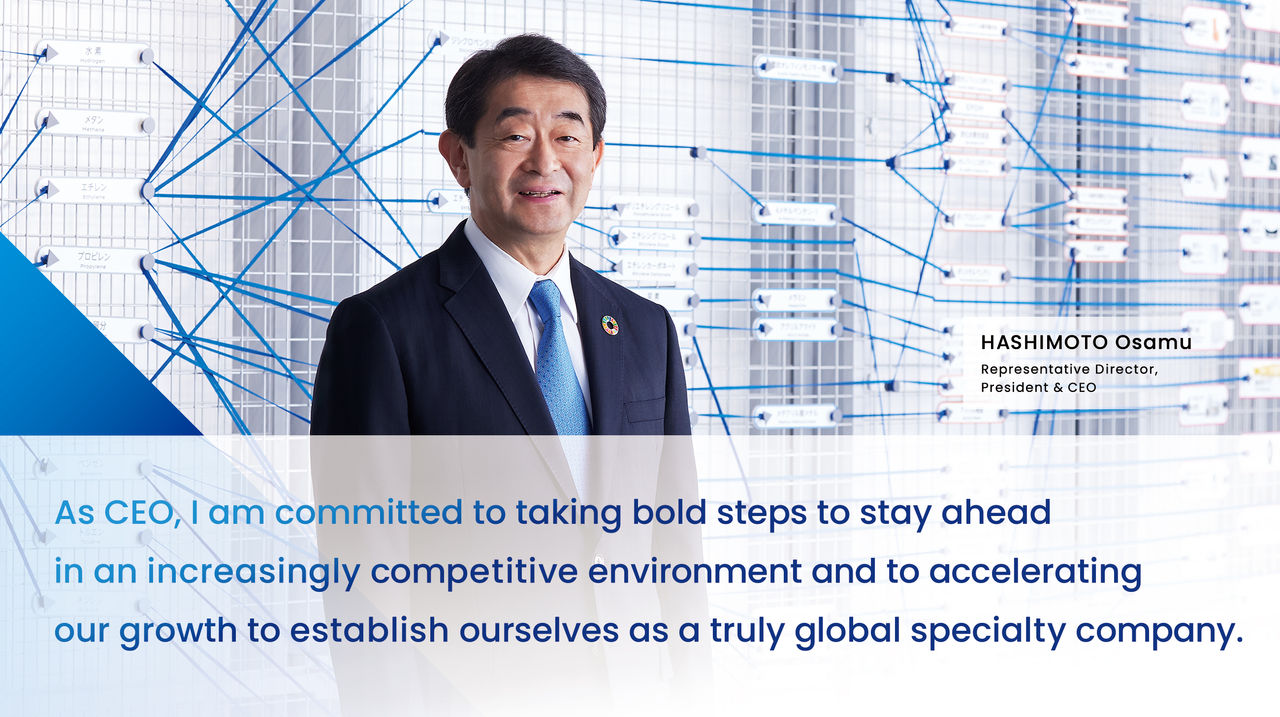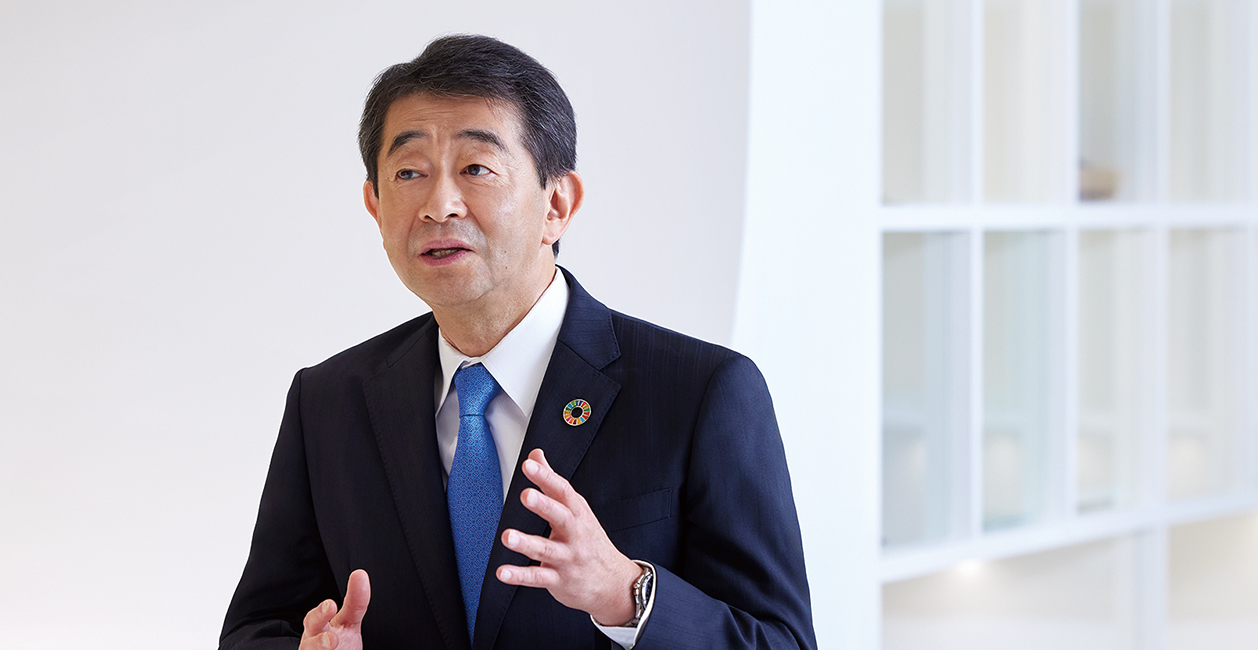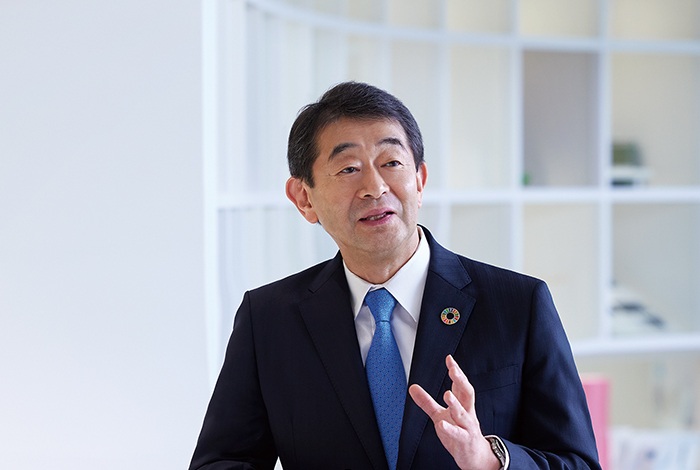CEO Message

Reflections on fiscal 2024 performance and key challenges
Taking swift action to address emerging challenges and return to a growth trajectory.
In fiscal 2024, the Mitsui Chemicals Group achieved year-on-year growth in both revenue and profit, driven by our solid expansion in the specialty chemicals domains. However, due to the impact of a plant-related issue, we were unable to achieve the level of profit expansion we had initially projected. I recognize that while our specialty chemicals domains continue to grow steadily, the pace has yet to meet our initial expectations. I also view improving capital efficiency as an urgent and critical priority, given the low level of net income attributable to owners of the parent relative to operating income before special items.
Looking back at our initiatives in fiscal 2024, we advanced restructuring measures in the Basic & Green Materials (B&GM) business as planned, including studies aimed at optimizing cracker operations. In western Japan, we have been working toward the optimization of our production system and the transition to carbon neutrality in ethylene manufacturing facilities, through a three-company collaboration with Asahi Kasei Corporation and Mitsubishi Chemical Corporation. Based on ongoing deliberations, including potential applications for the Green Innovation Fund, I expect that we will be able to finalize a concrete grand design within fiscal 2025. I recognize that we are also making solid progress in restructuring our derivatives operations in both Japan and overseas, including bringing forward a certain facility shutdown ahead of schedule. At the same time, we are facing rising cost pressures across the Mitsui Chemicals Group, particularly in labor and facility maintenance. I view the improvement of our cost structure through stronger cash flow management as an urgent priority in our efforts to enhance capital efficiency. Going forward, we must accelerate our business portfolio transformation through focused resource allocation, with a greater emphasis on capital efficiency, to return to a growth trajectory and move toward becoming a global specialty company.
Current business environment and future management direction
Accelerating our business portfolio transformation with a shared sense of urgency across the Group amid an increasingly challenging landscape.
In today’s global business environment, the rise of competitors—particularly in China—is exerting a significant impact. In the petrochemicals sector in particular, global markets are experiencing excess supply due to China’s capacity expansion. In addition, the country has been rapidly catching up in terms of technological capabilities in high-end fields, and is becoming an increasingly significant competitive threat across a broad range of applications, including semiconductor, automotive, and healthcare.
Against this backdrop, we announced our intention to split off the B&GM business at our CEO Presentation on May 30, 2025. Over the past two to three years, we have conducted extensive internal discussions regarding the potential split. What led us to make this announcement at this juncture is the growing recognition, amid global shifts, of the urgent need for transformation across the chemical industry. Another key factor behind this announcement is that, having made progress in restructuring through our own efforts, we as a Group are now firmly convinced that our next step must be to build a strong business entity with robust domestic competitiveness and ample resources. To make this vision a reality, accelerating partnerships with other companies and industry realignment will be essential. In addition, B&GM differs from our specialty chemicals domains in terms of strategic objectives and required decision-making speed. While our specialty chemicals domains are focused on succeeding in fierce global competition, B&GM aims to become Japan’s leading basic and green materials company by supporting a wide range of domestic customers—including from an economic security perspective—and realizing the shift toward green chemicals as an essential industry. These differences call for a distinct governance structure, and we have therefore set a target to complete the split by around 2027. This sense of urgency is shared both within and beyond the chemical industry, and I believe that the pace of transformation will only continue to accelerate going forward.
At the same time, we also anticipate intensifying global competition in our specialty chemicals domains. For example, Japan’s manufacturing industry has historically succeeded with a business model that integrates both upstream and downstream operations. In recent years, however, emerging companies from China and other parts of Asia are on the rise even within downstream fields where Japanese firms once held a clear advantage. This is already evident in sectors such as automotive, semiconductors, and steel—and similar seismic shifts are now underway in the chemical industry as well. To remain competitive in this environment and pursue our vision of becoming a global specialty company, we must accelerate forward-looking development. Strengthening the fundamentals—technology, talent, capital, and other resources—through alliances and M&A will be our top strategic priority in the specialty chemicals domains.
Key challenges and strategies in specialty chemicals domains
Expanding our business globally through continued proactive investments while remaining mindful of capital efficiency.

While the overall growth rate of our specialty chemicals domains since fiscal 2019 has not reached the level we initially expected, Life & Healthcare Solutions (L&HC) is currently growing steadily at around 18%, and Mobility Solutions at approximately 9%. We believe both businesses are firmly on track to meet their targets. On the other hand, for ICT Solutions, we have set a target of doubling the current growth rate by fiscal 2030. Achieving this will require improved capital efficiency and focused, selective investment in key businesses. In 2025, we invested in Shinko Electric Industries to lay the groundwork for business expansion in semiconductor packaging materials—a field where demand is expected to grow significantly. Shinko brings strong capabilities in evaluation technologies for semiconductor manufacturing processes, and we see significant potential for synergies with our own materials technologies, particularly in back-end processes. To strengthen our presence in front-end processes of semiconductor manufacturing as well, we are also exploring additional M&A opportunities as needed.
As the global market landscape is undergoing significant changes due to the shifts in the business environment described above, it is becoming increasingly essential to accelerate the global expansion of our specialty chemicals domains, including into emerging markets. We must move away from our historically centralized structure, in which local market intelligence was first brought back to Japan for investment decisions and R&D. Going forward, we will accelerate our regional strategies by advancing localization—integrating production, sales, and R&D within each region—to respond to local needs with greater speed and precision. Under this policy, we will delegate greater authority to our regional headquarters, enabling them to take on strategic functions, including promoting collaboration with affiliates and overseeing R&D. One example of this commitment is the appointment of Antonios Grigoriou, President of Mitsui Chemicals America, as Business Sector Vice President of L&HC. This move reflects both the growing importance of the U.S. healthcare market and our focus on future expansion. Another critical initiative is breaking down silos between business sectors. By shifting away from individually optimized operations toward a more integrated management model, we aim to share assets across businesses wherever possible and enhance efficiency on the operational front. To support these efforts, our newly established Regional Strategy Division, inaugurated in 2025, will play a central role in formulating roadmaps and milestones and ensuring the swift execution of concrete measures. Additionally, the CxO Working Group, launched in 2024, has been conducting focused discussions across business sectors to drive functional strategies under each CxO’s leadership.
While accelerating the execution of these initiatives, we will also take concrete steps to improve capital efficiency. To that end, it is essential not only to enhance our earning power via revenue growth but also to practice more rigorous cash flow management than ever before. We will thoroughly review the outcomes of our past investments and promptly take corrective action for any businesses or affiliates that are not generating returns commensurate with the capital invested. With a more stringent and systematic approach than in the past, we will re-evaluate the positioning of each business, including affiliates. For areas with profitability or capital efficiency issues, we will establish restructuring milestones, monitor progress annually, and, where appropriate, consider exploring more suitable owners. By thoroughly implementing these initiatives, we will move closer to achieving our numerical targets, including ROIC and ROE. In terms of cash allocation, we aim to increase our dividend levels by generating and expanding free cash flow. This, in turn, could make it possible for us to further raise our dividends on equity (DOE) target—a key focus for the Group’s dividend policy—from the current 3% to the 4% range.
Promoting new business and product development
Driving a shift toward design thinking across all Group businesses to realize a solutions-based business model.
Since the announcement of VISION 2030, we have continued to increase investment in building solutions-based business models and in developing new products and businesses. However, I recognize that the results achieved so far have not been fully satisfactory. One of the main reasons is that our approach to business creation has remained largely within the bounds of a conventional B2B mindset. In developing B2C businesses, or B2P (business-to-professional) businesses that are central to L&HC such as oral care, it is essential to adopt a downstream perspective—one that reflects the standpoint of consumers and actual users of our products and services. The appointment of OMOTE Toshihiko as our new CTO, who brings deep expertise in these areas, is part of our broader efforts to accelerate this shift. In alignment with the regional strategy mentioned earlier, we are also reallocating R&D resources—including talent—closer to the markets and consumers. Equally important is moving away from the conventional business of supplying materials focused solely on aligning with immediate customer needs, and instead prioritizing business design from the outset. A case in point is our 2024 investment in Glydways. Our collaboration began by aligning on a shared vision for the company’s envisioned next-generation transportation system, including its overall concept and ultimate form. We then identified areas—from development through to maintenance and recycling—where our Group could contribute, and adopted a holistic approach to deliver a full suite of materials and technologies. This kind of approach—first gaining a comprehensive understanding of the overall business, then pinpointing where our strengths can be applied—is key to building strong, defensible competitive advantages that are difficult for others to replicate. This way of thinking is steadily taking root within the Mitsui Chemicals Group. Under the leadership of CTO Omote, we intend to expand this mindset beyond the New Business Incubation Center, where promising ventures have already begun to take shape, and embed it across all business segments.
Status of non-financial KPIs and our approach to sustainability
Believing that sustainability lies at the very heart of our business, we are committed to it with sincerity.

While we have generally met the annual targets for the non-financial KPIs set under VISION 2030, I believe it is essential to continuously assess whether these indicators are genuinely linked to financial metrics.
One particularly important set of KPIs for the Group—also factored into executive compensation—is the sales revenue ratios of Blue Value™ and Rose Value™ products. However, these ratios have recently shown signs of slowing growth. As these KPIs are fundamentally underpinned by the performance of new business and product development, I believe they will naturally improve as design thinking becomes further embedded throughout the Group and the pace of innovation accelerates.
Moreover, regarding the material topics of safety and stable production, the 2024 plant incident had a substantial impact on our financial performance. In response, we plan to rapidly reinforce our production technology framework and to undertake a comprehensive review that extends beyond technology to include our work styles and organizational structure. In other words, non-financial indicators such as safety and stable production also serve as measures of how well the organizational foundation supporting them is in place.
While we have not yet reached fully satisfactory levels in human capital-related KPIs such as the ratio of women in management positions and the number of executive officers with diverse backgrounds, we are making steady progress in advancing diversity. On the other hand, our employee engagement score in fiscal 2024 remained at the same level as the previous fiscal year, and we are currently analyzing the underlying causes for not meeting our target. However, one encouraging sign is improvement in the STRIVE category, which is strongly correlated with employee productivity. To support our digital transformation, we launched a new data scientist and specialist program in 2025. This initiative is designed to ensure appropriate compensation for highly skilled digital professionals and to create an environment where they can fully demonstrate their abilities. In addition, under the CxO Working Group, we are discussing enhancements to recruitment and development programs for professionals, as well as designing more flexible HR systems that accommodate employees’ various life stages.
While there has been some recent backlash against ESG initiatives in regions such as the United States, the Mitsui Chemicals Group’s view on material topics and sustainability is neither transient nor merely a means of driving business or management. Rather, it represents a fundamental corporate policy and sits at the core of our management approach. As such, I see no need to alter this stance.
My mission as CEO
Fulfilling our responsibilities as a corporate group and living up to the expectations of all our stakeholders.
I believe that building a company where both the organization and its employees grow together is vital. Beyond that, I see it as my responsibility as CEO to take a broader view—one that includes shareholders and all other stakeholders—enhancing corporate value while clearly communicating the direction our Group is pursuing, and guiding our journey in a way that earns their confidence and support. I also believe that our relationships with stakeholders should be built on equal footing. In line with this belief, we have introduced a stock incentive plan for employees, creating an environment in which they can share the same perspective as our shareholders and think in alignment with them. This fundamental mindset serves as a guiding principle behind our management planning framework, and it will remain unchanged. In 2025, we announced our intention to split off the B&GM business, marking a major policy shift for the Mitsui Chemicals Group. The announcement prompted significant responses from top executives of chemical companies around the world. This reaffirmed the magnitude of the decision and reminded me of the expectations placed on our Group—and the weight of the responsibility we carry. The announcement renewed my conviction that we must build a company in which all stakeholders—including our employees and shareholders—can place their full confidence. It strengthened my resolve to see that mission through to completion. Our business portfolio transformation remains a work in progress. Even amid an increasingly challenging external environment, we are committed to taking swift and necessary actions toward becoming a global specialty company with a strong global presence. Through these efforts, we aim to deliver tangible results and live up to your expectations.
